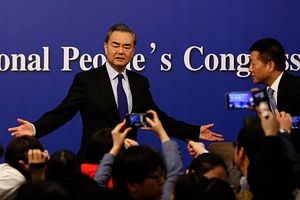On March 8, as The Diplomat has already noted, Chinese Foreign Minister Wang Yi held his yearly press conference on the sidelines of the annual session of the National People’s Congress. In his remarks, Wang provided the most detailed response yet from a Chinese official to the latest hopeful developments on the Korean Peninsula.
A quick recap on what’s taken place so far this year: North Korean leader Kim Jong-un signaled a willingness to participate in the PyeongChang Winter Olympics in South Korea during his New Year’s address. South Korean President Moon Jae-in quickly took Kim up on the offer; not only did North Korea send athletes to the games, but the two sides agreed to march together in the Opening Ceremony under a unified Korean flag. North Korea also sent high-ranking officials to the Opening and Closing Ceremonies, most notably Kim Yo-jong, Kim Jong-un’s sister and Kim Yong-chol, the head of the Korean Worker’s Party’s United Front Department, respectively. This week, a delegation of South Korean officials returned from a visit to Pyongyang with news of a breakthrough, announcing at their post-trip press conference that North Korea was willing to discuss denuclearization with the United States (as The Diplomat’s Ankit Panda has pointed out, though, so far North Korea has not clearly indicated the same thing).
China has responded positively to the developments, as one would expect. On March 6, Foreign Ministry spokesperson Geng Shuang issued a statement saying that” China always supports the efforts made by the DPRK and ROK to improve their relations,” referring to the formal names of North Korea (the Democratic People’s Republic of Korea) and South Korea (the Republic of Korea). “We hope that all relevant parties can seize the current opportunity, work for the shared goal and make concerted efforts to promote the process of denuclearizing the Peninsula and politically resolving the Korean Peninsula issue,” Geng added.
Wang was also asked about the recent developments in his press conference, and his answer went into more detail than previous statements from the Foreign Ministry. As expected, Wang praised the recent diplomatic efforts by North and South Korea, emphasizing that the current period of warmth is unlike anything seen on the Korean Peninsula in some time. It’s an “important step” in the “right direction” for solving the Korean issue, Wang said, and China gives its affirmation and support to the efforts of both Pyongyang and Seoul in that regard.
However, Wang also made sure to save some of the credit for China. He pointed out that during the Olympics, North Korea had not conducted any new nuclear or missile tests while the United States and South Korea had put off their joint military exercises. China’s “dual freeze” proposal, unveiled last year during Wang’s press conference, involves halting both nuclear and missiles tests in exchange for the suspension of U.S.-South Korea drills. Accordingly, Wang said, the current thaw was “proof” that the “dual freeze” was an “effective prescription,” which had provided the “most basic conditions” for improved North-South relations. Wang did not mention the fact that the United States and South Korea have repeatedly stated they plan to resume joint exercises in April.
Wang also brought up another Chinese proposal for solving the Korean issue: the idea of pursuing denuclearization and normalization of the overall security situation in parallel but simultaneous negotiations. In their dialogues, Wang said, all parties should equally address both denuclearization and “legitimate security concerns” (including those of North Korea). To this end, Wang encouraged all parties, “especially the United States and North Korea,” to initiate contact and dialogue.
Wang ended his remarks with a warning: while the light is visible at the end of the tunnel, the road ahead will not be smooth. “History tells us that every time the situation on the peninsula eases, all kinds of disturbances will follow, one after the other,” Wang said. “[…] Now we have once again come to the crucial time of testing whether or not each party sincerely hopes to solve the nuclear issue on the Peninsula.”
It was not clear in Wang’s comments which parties might be insincere about coming to a solution – possibly all of them. However, part of the original question from the reporter (representing Reuters) was whether China believed that the United States should withdraw its forces from South Korea. In the past, Chinese analysts have suggested that Washington does not truly want to solve the Korea issue, because a lasting peace there would remove the rationale for its bases in South Korea. It’s possible that Wang was making a very oblique reference to this line of thinking in his warning about the potential for insincerity or “disturbance” (also translatable as “interference”).
Wang ended his comments by calling for all sides to take up their “political courage” and make a “political decision” to pursue dialogue as quickly as possible.
“China will continue to put forth tireless efforts to this end,” Wang concluded.

































